Literature Review: Operationalizing CSR & Student Engagement in Al Ain
VerifiedAdded on 2023/06/13
|7
|2207
|497
Literature Review
AI Summary
This literature review explores the role of Corporate Social Responsibility (CSR) in the education sector, particularly focusing on student engagement in community services within Al Ain, United Arab Emirates. It highlights the integration of CSR into business models, emphasizing adherence to laws and regulations while managing social and environmental well-being. The review underscores the importance of education and how CSR initiatives in the UAE provide training in soft skills, design thinking, leadership, and entrepreneurship, enhancing job skills and knowledge. It further discusses how universities leverage CSR to improve communities and promote student involvement in community services, fostering social skills and problem-solving abilities. The paper concludes that CSR is vital for student development, societal growth, and addressing community issues, with institutions like the University of Dubai leading CSR initiatives in the region. Desklib provides access to similar solved assignments and study resources for students.
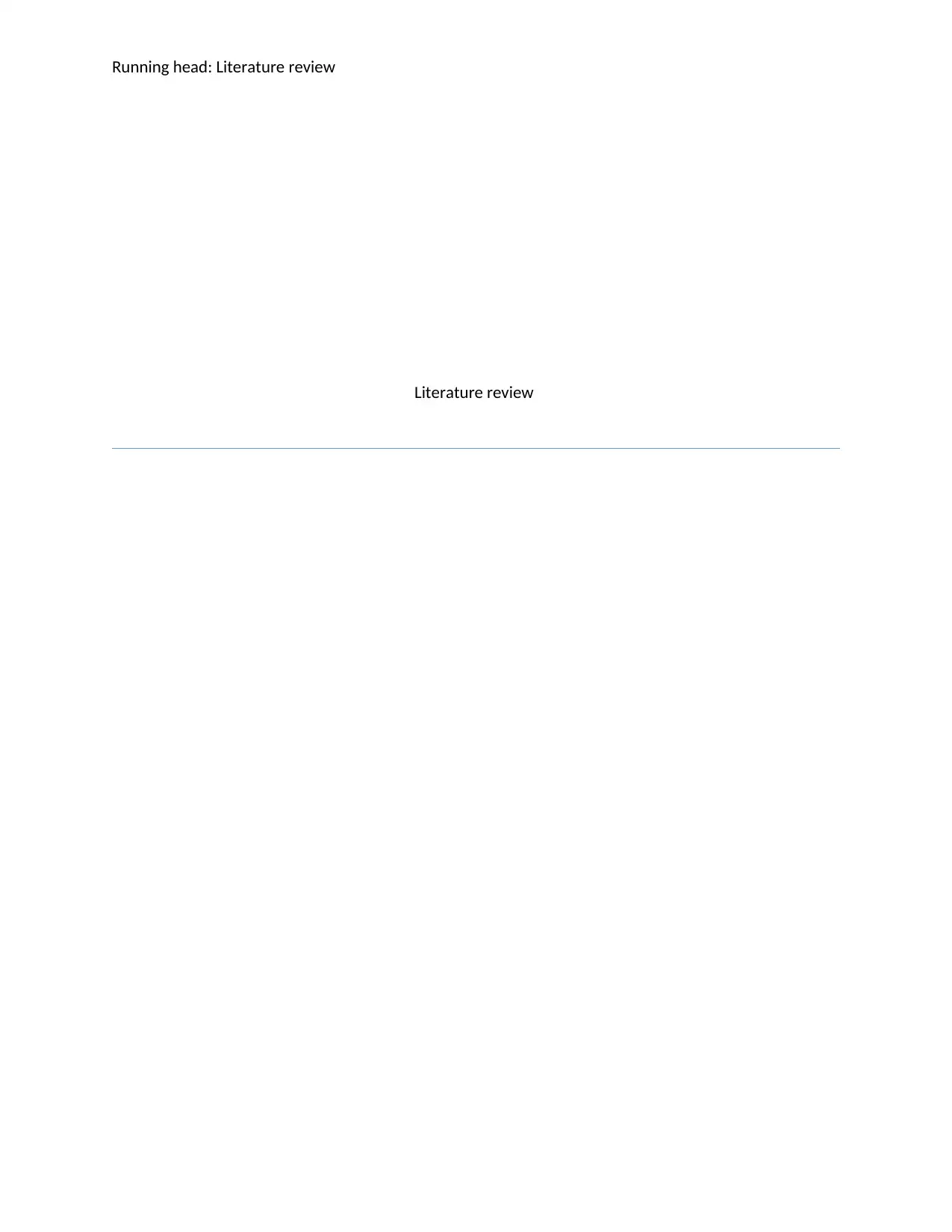
Running head: Literature review
Literature review
Literature review
Paraphrase This Document
Need a fresh take? Get an instant paraphrase of this document with our AI Paraphraser
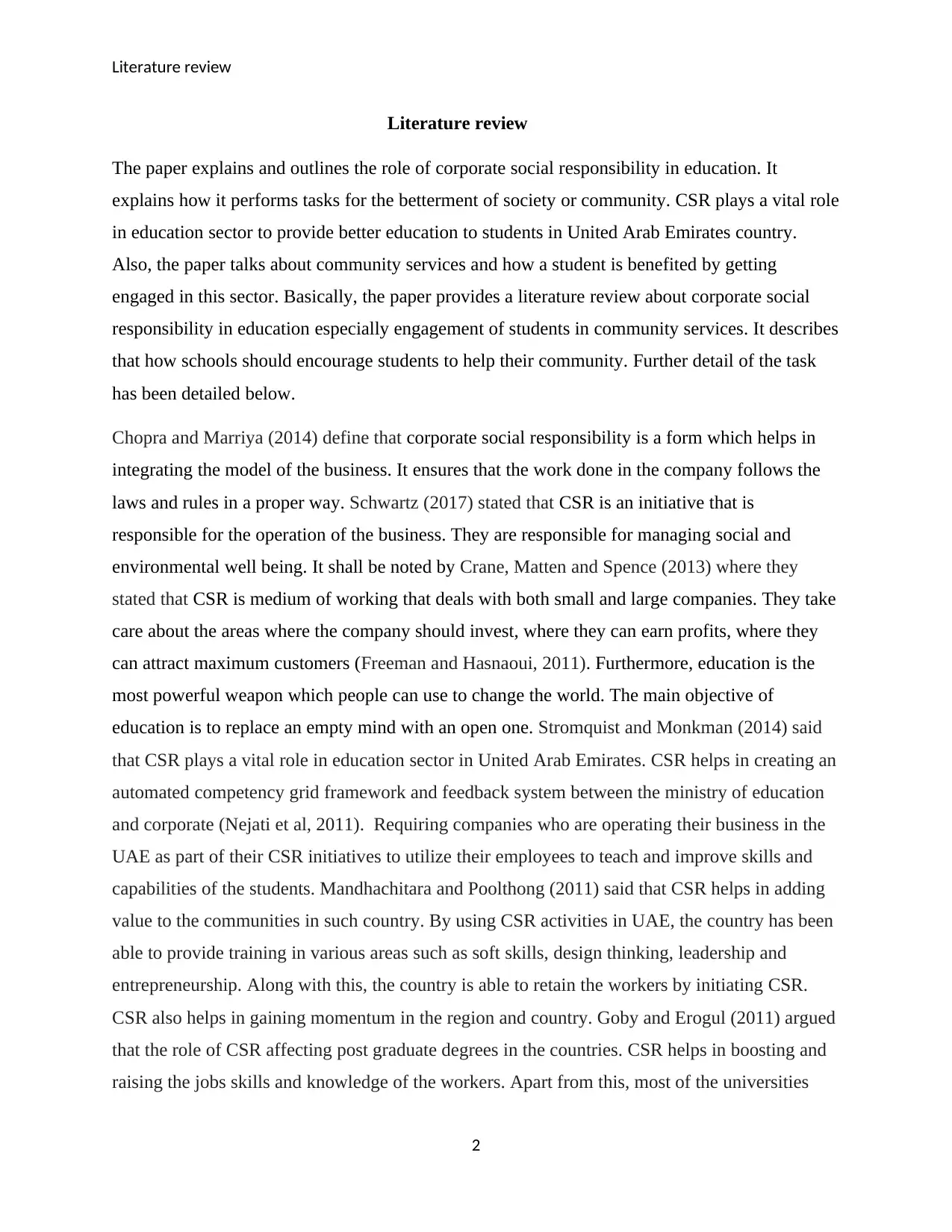
Literature review
Literature review
The paper explains and outlines the role of corporate social responsibility in education. It
explains how it performs tasks for the betterment of society or community. CSR plays a vital role
in education sector to provide better education to students in United Arab Emirates country.
Also, the paper talks about community services and how a student is benefited by getting
engaged in this sector. Basically, the paper provides a literature review about corporate social
responsibility in education especially engagement of students in community services. It describes
that how schools should encourage students to help their community. Further detail of the task
has been detailed below.
Chopra and Marriya (2014) define that corporate social responsibility is a form which helps in
integrating the model of the business. It ensures that the work done in the company follows the
laws and rules in a proper way. Schwartz (2017) stated that CSR is an initiative that is
responsible for the operation of the business. They are responsible for managing social and
environmental well being. It shall be noted by Crane, Matten and Spence (2013) where they
stated that CSR is medium of working that deals with both small and large companies. They take
care about the areas where the company should invest, where they can earn profits, where they
can attract maximum customers (Freeman and Hasnaoui, 2011). Furthermore, education is the
most powerful weapon which people can use to change the world. The main objective of
education is to replace an empty mind with an open one. Stromquist and Monkman (2014) said
that CSR plays a vital role in education sector in United Arab Emirates. CSR helps in creating an
automated competency grid framework and feedback system between the ministry of education
and corporate (Nejati et al, 2011). Requiring companies who are operating their business in the
UAE as part of their CSR initiatives to utilize their employees to teach and improve skills and
capabilities of the students. Mandhachitara and Poolthong (2011) said that CSR helps in adding
value to the communities in such country. By using CSR activities in UAE, the country has been
able to provide training in various areas such as soft skills, design thinking, leadership and
entrepreneurship. Along with this, the country is able to retain the workers by initiating CSR.
CSR also helps in gaining momentum in the region and country. Goby and Erogul (2011) argued
that the role of CSR affecting post graduate degrees in the countries. CSR helps in boosting and
raising the jobs skills and knowledge of the workers. Apart from this, most of the universities
2
Literature review
The paper explains and outlines the role of corporate social responsibility in education. It
explains how it performs tasks for the betterment of society or community. CSR plays a vital role
in education sector to provide better education to students in United Arab Emirates country.
Also, the paper talks about community services and how a student is benefited by getting
engaged in this sector. Basically, the paper provides a literature review about corporate social
responsibility in education especially engagement of students in community services. It describes
that how schools should encourage students to help their community. Further detail of the task
has been detailed below.
Chopra and Marriya (2014) define that corporate social responsibility is a form which helps in
integrating the model of the business. It ensures that the work done in the company follows the
laws and rules in a proper way. Schwartz (2017) stated that CSR is an initiative that is
responsible for the operation of the business. They are responsible for managing social and
environmental well being. It shall be noted by Crane, Matten and Spence (2013) where they
stated that CSR is medium of working that deals with both small and large companies. They take
care about the areas where the company should invest, where they can earn profits, where they
can attract maximum customers (Freeman and Hasnaoui, 2011). Furthermore, education is the
most powerful weapon which people can use to change the world. The main objective of
education is to replace an empty mind with an open one. Stromquist and Monkman (2014) said
that CSR plays a vital role in education sector in United Arab Emirates. CSR helps in creating an
automated competency grid framework and feedback system between the ministry of education
and corporate (Nejati et al, 2011). Requiring companies who are operating their business in the
UAE as part of their CSR initiatives to utilize their employees to teach and improve skills and
capabilities of the students. Mandhachitara and Poolthong (2011) said that CSR helps in adding
value to the communities in such country. By using CSR activities in UAE, the country has been
able to provide training in various areas such as soft skills, design thinking, leadership and
entrepreneurship. Along with this, the country is able to retain the workers by initiating CSR.
CSR also helps in gaining momentum in the region and country. Goby and Erogul (2011) argued
that the role of CSR affecting post graduate degrees in the countries. CSR helps in boosting and
raising the jobs skills and knowledge of the workers. Apart from this, most of the universities
2
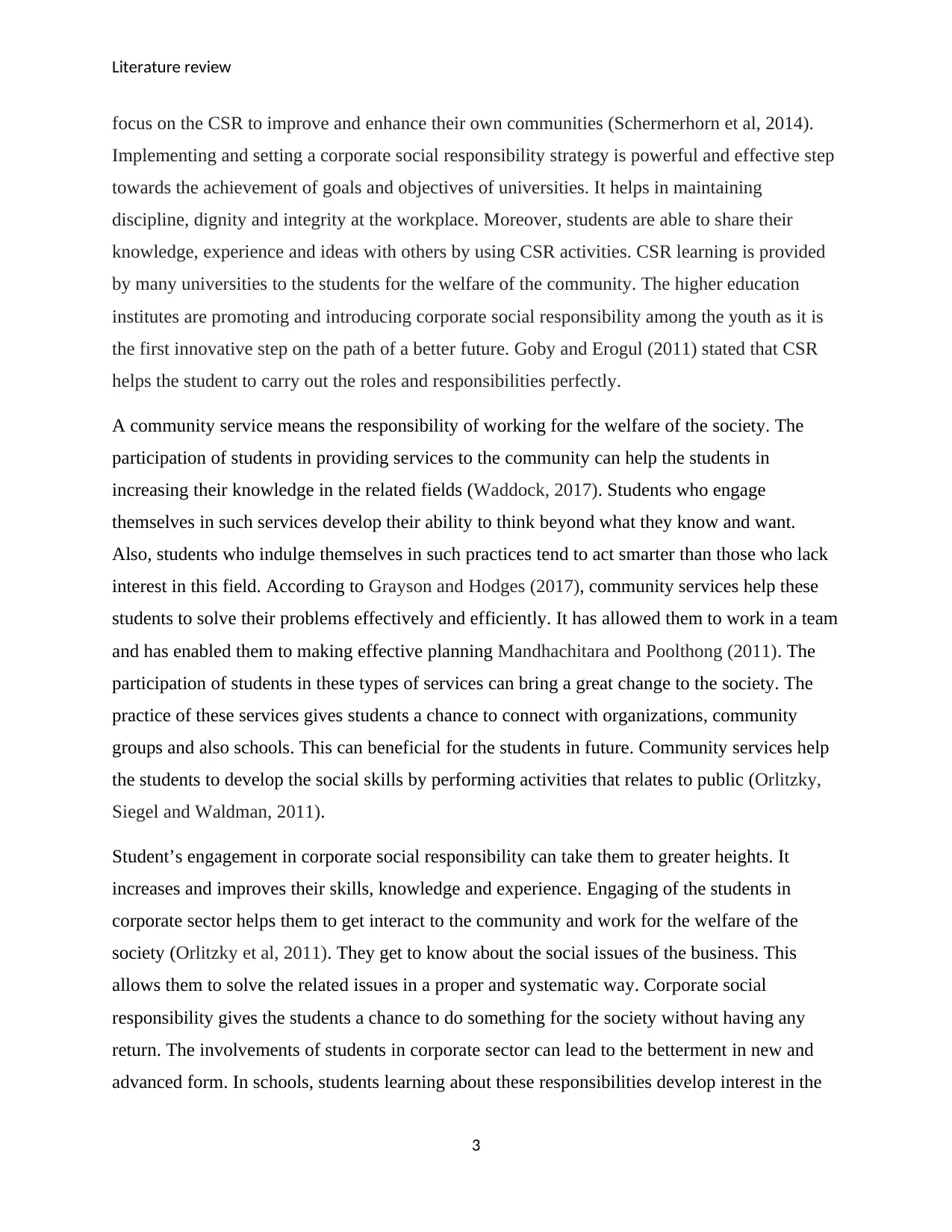
Literature review
focus on the CSR to improve and enhance their own communities (Schermerhorn et al, 2014).
Implementing and setting a corporate social responsibility strategy is powerful and effective step
towards the achievement of goals and objectives of universities. It helps in maintaining
discipline, dignity and integrity at the workplace. Moreover, students are able to share their
knowledge, experience and ideas with others by using CSR activities. CSR learning is provided
by many universities to the students for the welfare of the community. The higher education
institutes are promoting and introducing corporate social responsibility among the youth as it is
the first innovative step on the path of a better future. Goby and Erogul (2011) stated that CSR
helps the student to carry out the roles and responsibilities perfectly.
A community service means the responsibility of working for the welfare of the society. The
participation of students in providing services to the community can help the students in
increasing their knowledge in the related fields (Waddock, 2017). Students who engage
themselves in such services develop their ability to think beyond what they know and want.
Also, students who indulge themselves in such practices tend to act smarter than those who lack
interest in this field. According to Grayson and Hodges (2017), community services help these
students to solve their problems effectively and efficiently. It has allowed them to work in a team
and has enabled them to making effective planning Mandhachitara and Poolthong (2011). The
participation of students in these types of services can bring a great change to the society. The
practice of these services gives students a chance to connect with organizations, community
groups and also schools. This can beneficial for the students in future. Community services help
the students to develop the social skills by performing activities that relates to public (Orlitzky,
Siegel and Waldman, 2011).
Student’s engagement in corporate social responsibility can take them to greater heights. It
increases and improves their skills, knowledge and experience. Engaging of the students in
corporate sector helps them to get interact to the community and work for the welfare of the
society (Orlitzky et al, 2011). They get to know about the social issues of the business. This
allows them to solve the related issues in a proper and systematic way. Corporate social
responsibility gives the students a chance to do something for the society without having any
return. The involvements of students in corporate sector can lead to the betterment in new and
advanced form. In schools, students learning about these responsibilities develop interest in the
3
focus on the CSR to improve and enhance their own communities (Schermerhorn et al, 2014).
Implementing and setting a corporate social responsibility strategy is powerful and effective step
towards the achievement of goals and objectives of universities. It helps in maintaining
discipline, dignity and integrity at the workplace. Moreover, students are able to share their
knowledge, experience and ideas with others by using CSR activities. CSR learning is provided
by many universities to the students for the welfare of the community. The higher education
institutes are promoting and introducing corporate social responsibility among the youth as it is
the first innovative step on the path of a better future. Goby and Erogul (2011) stated that CSR
helps the student to carry out the roles and responsibilities perfectly.
A community service means the responsibility of working for the welfare of the society. The
participation of students in providing services to the community can help the students in
increasing their knowledge in the related fields (Waddock, 2017). Students who engage
themselves in such services develop their ability to think beyond what they know and want.
Also, students who indulge themselves in such practices tend to act smarter than those who lack
interest in this field. According to Grayson and Hodges (2017), community services help these
students to solve their problems effectively and efficiently. It has allowed them to work in a team
and has enabled them to making effective planning Mandhachitara and Poolthong (2011). The
participation of students in these types of services can bring a great change to the society. The
practice of these services gives students a chance to connect with organizations, community
groups and also schools. This can beneficial for the students in future. Community services help
the students to develop the social skills by performing activities that relates to public (Orlitzky,
Siegel and Waldman, 2011).
Student’s engagement in corporate social responsibility can take them to greater heights. It
increases and improves their skills, knowledge and experience. Engaging of the students in
corporate sector helps them to get interact to the community and work for the welfare of the
society (Orlitzky et al, 2011). They get to know about the social issues of the business. This
allows them to solve the related issues in a proper and systematic way. Corporate social
responsibility gives the students a chance to do something for the society without having any
return. The involvements of students in corporate sector can lead to the betterment in new and
advanced form. In schools, students learning about these responsibilities develop interest in the
3
⊘ This is a preview!⊘
Do you want full access?
Subscribe today to unlock all pages.

Trusted by 1+ million students worldwide
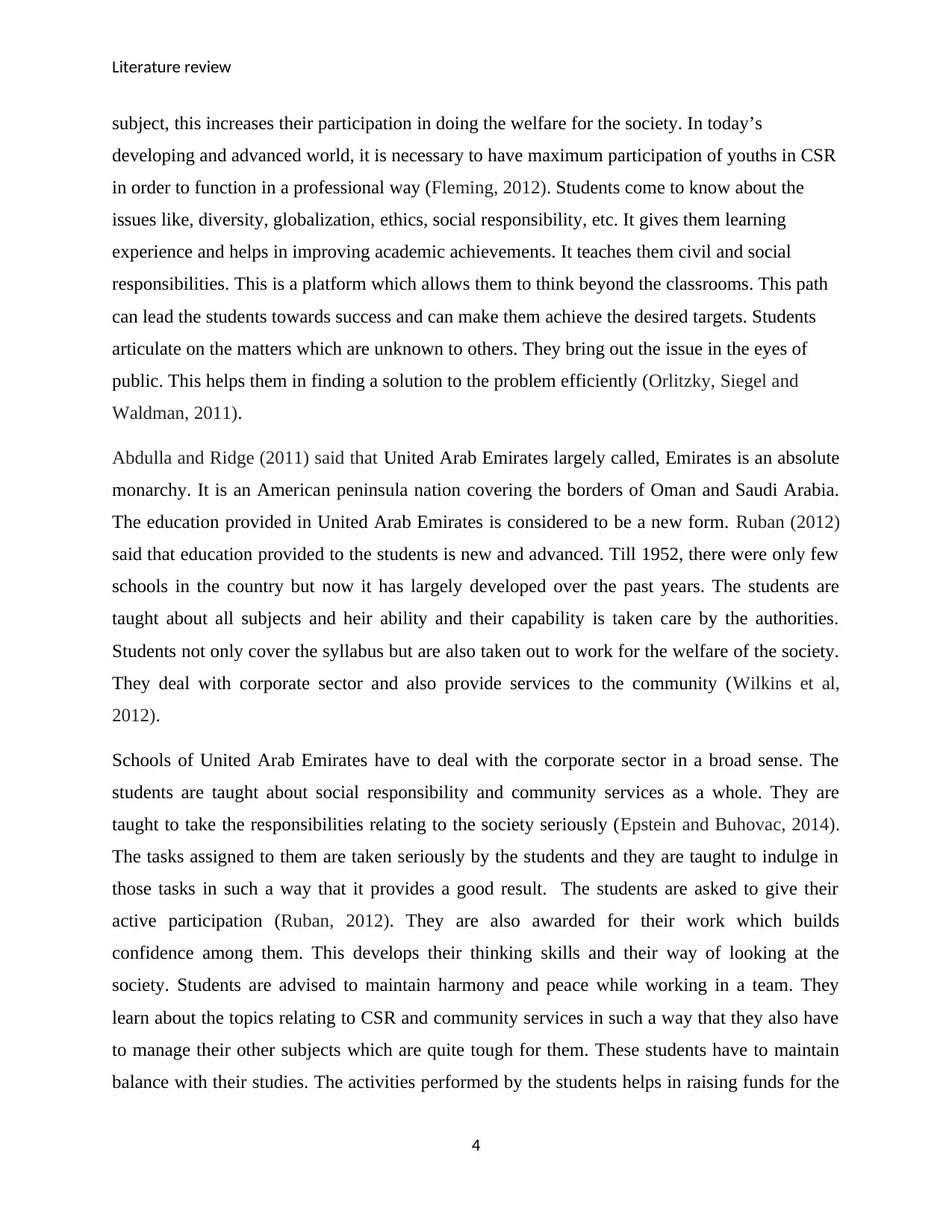
Literature review
subject, this increases their participation in doing the welfare for the society. In today’s
developing and advanced world, it is necessary to have maximum participation of youths in CSR
in order to function in a professional way (Fleming, 2012). Students come to know about the
issues like, diversity, globalization, ethics, social responsibility, etc. It gives them learning
experience and helps in improving academic achievements. It teaches them civil and social
responsibilities. This is a platform which allows them to think beyond the classrooms. This path
can lead the students towards success and can make them achieve the desired targets. Students
articulate on the matters which are unknown to others. They bring out the issue in the eyes of
public. This helps them in finding a solution to the problem efficiently (Orlitzky, Siegel and
Waldman, 2011).
Abdulla and Ridge (2011) said that United Arab Emirates largely called, Emirates is an absolute
monarchy. It is an American peninsula nation covering the borders of Oman and Saudi Arabia.
The education provided in United Arab Emirates is considered to be a new form. Ruban (2012)
said that education provided to the students is new and advanced. Till 1952, there were only few
schools in the country but now it has largely developed over the past years. The students are
taught about all subjects and heir ability and their capability is taken care by the authorities.
Students not only cover the syllabus but are also taken out to work for the welfare of the society.
They deal with corporate sector and also provide services to the community (Wilkins et al,
2012).
Schools of United Arab Emirates have to deal with the corporate sector in a broad sense. The
students are taught about social responsibility and community services as a whole. They are
taught to take the responsibilities relating to the society seriously (Epstein and Buhovac, 2014).
The tasks assigned to them are taken seriously by the students and they are taught to indulge in
those tasks in such a way that it provides a good result. The students are asked to give their
active participation (Ruban, 2012). They are also awarded for their work which builds
confidence among them. This develops their thinking skills and their way of looking at the
society. Students are advised to maintain harmony and peace while working in a team. They
learn about the topics relating to CSR and community services in such a way that they also have
to manage their other subjects which are quite tough for them. These students have to maintain
balance with their studies. The activities performed by the students helps in raising funds for the
4
subject, this increases their participation in doing the welfare for the society. In today’s
developing and advanced world, it is necessary to have maximum participation of youths in CSR
in order to function in a professional way (Fleming, 2012). Students come to know about the
issues like, diversity, globalization, ethics, social responsibility, etc. It gives them learning
experience and helps in improving academic achievements. It teaches them civil and social
responsibilities. This is a platform which allows them to think beyond the classrooms. This path
can lead the students towards success and can make them achieve the desired targets. Students
articulate on the matters which are unknown to others. They bring out the issue in the eyes of
public. This helps them in finding a solution to the problem efficiently (Orlitzky, Siegel and
Waldman, 2011).
Abdulla and Ridge (2011) said that United Arab Emirates largely called, Emirates is an absolute
monarchy. It is an American peninsula nation covering the borders of Oman and Saudi Arabia.
The education provided in United Arab Emirates is considered to be a new form. Ruban (2012)
said that education provided to the students is new and advanced. Till 1952, there were only few
schools in the country but now it has largely developed over the past years. The students are
taught about all subjects and heir ability and their capability is taken care by the authorities.
Students not only cover the syllabus but are also taken out to work for the welfare of the society.
They deal with corporate sector and also provide services to the community (Wilkins et al,
2012).
Schools of United Arab Emirates have to deal with the corporate sector in a broad sense. The
students are taught about social responsibility and community services as a whole. They are
taught to take the responsibilities relating to the society seriously (Epstein and Buhovac, 2014).
The tasks assigned to them are taken seriously by the students and they are taught to indulge in
those tasks in such a way that it provides a good result. The students are asked to give their
active participation (Ruban, 2012). They are also awarded for their work which builds
confidence among them. This develops their thinking skills and their way of looking at the
society. Students are advised to maintain harmony and peace while working in a team. They
learn about the topics relating to CSR and community services in such a way that they also have
to manage their other subjects which are quite tough for them. These students have to maintain
balance with their studies. The activities performed by the students helps in raising funds for the
4
Paraphrase This Document
Need a fresh take? Get an instant paraphrase of this document with our AI Paraphraser
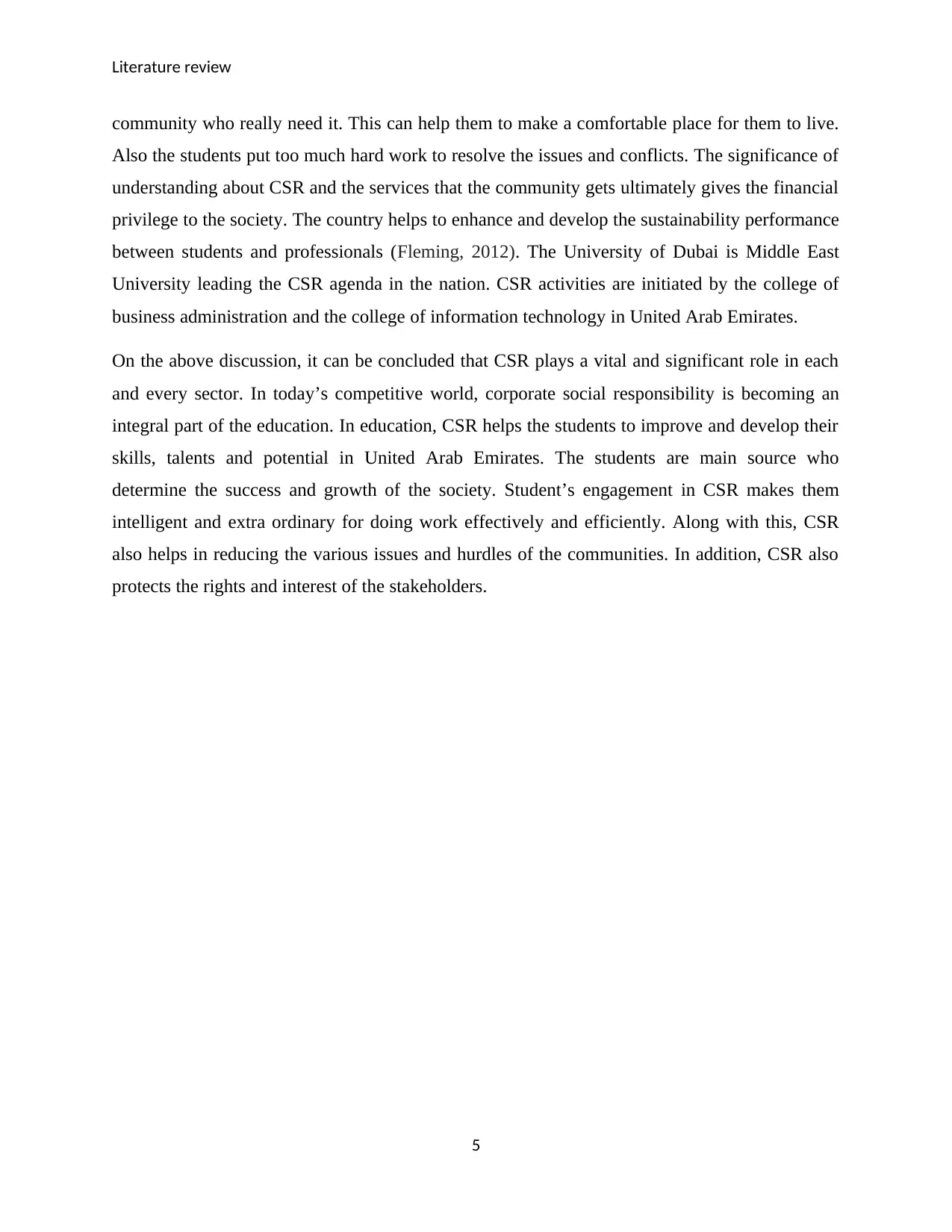
Literature review
community who really need it. This can help them to make a comfortable place for them to live.
Also the students put too much hard work to resolve the issues and conflicts. The significance of
understanding about CSR and the services that the community gets ultimately gives the financial
privilege to the society. The country helps to enhance and develop the sustainability performance
between students and professionals (Fleming, 2012). The University of Dubai is Middle East
University leading the CSR agenda in the nation. CSR activities are initiated by the college of
business administration and the college of information technology in United Arab Emirates.
On the above discussion, it can be concluded that CSR plays a vital and significant role in each
and every sector. In today’s competitive world, corporate social responsibility is becoming an
integral part of the education. In education, CSR helps the students to improve and develop their
skills, talents and potential in United Arab Emirates. The students are main source who
determine the success and growth of the society. Student’s engagement in CSR makes them
intelligent and extra ordinary for doing work effectively and efficiently. Along with this, CSR
also helps in reducing the various issues and hurdles of the communities. In addition, CSR also
protects the rights and interest of the stakeholders.
5
community who really need it. This can help them to make a comfortable place for them to live.
Also the students put too much hard work to resolve the issues and conflicts. The significance of
understanding about CSR and the services that the community gets ultimately gives the financial
privilege to the society. The country helps to enhance and develop the sustainability performance
between students and professionals (Fleming, 2012). The University of Dubai is Middle East
University leading the CSR agenda in the nation. CSR activities are initiated by the college of
business administration and the college of information technology in United Arab Emirates.
On the above discussion, it can be concluded that CSR plays a vital and significant role in each
and every sector. In today’s competitive world, corporate social responsibility is becoming an
integral part of the education. In education, CSR helps the students to improve and develop their
skills, talents and potential in United Arab Emirates. The students are main source who
determine the success and growth of the society. Student’s engagement in CSR makes them
intelligent and extra ordinary for doing work effectively and efficiently. Along with this, CSR
also helps in reducing the various issues and hurdles of the communities. In addition, CSR also
protects the rights and interest of the stakeholders.
5
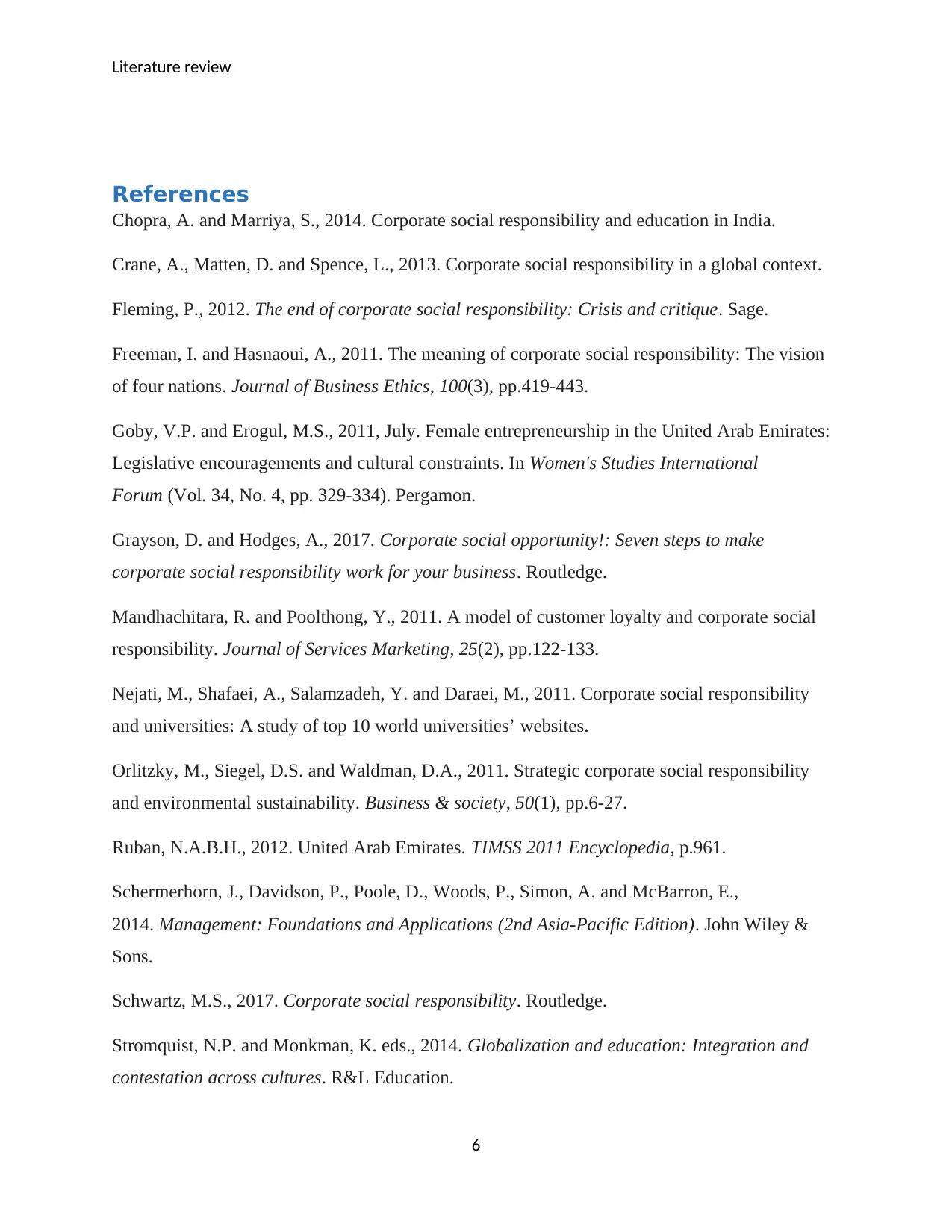
Literature review
References
Chopra, A. and Marriya, S., 2014. Corporate social responsibility and education in India.
Crane, A., Matten, D. and Spence, L., 2013. Corporate social responsibility in a global context.
Fleming, P., 2012. The end of corporate social responsibility: Crisis and critique. Sage.
Freeman, I. and Hasnaoui, A., 2011. The meaning of corporate social responsibility: The vision
of four nations. Journal of Business Ethics, 100(3), pp.419-443.
Goby, V.P. and Erogul, M.S., 2011, July. Female entrepreneurship in the United Arab Emirates:
Legislative encouragements and cultural constraints. In Women's Studies International
Forum (Vol. 34, No. 4, pp. 329-334). Pergamon.
Grayson, D. and Hodges, A., 2017. Corporate social opportunity!: Seven steps to make
corporate social responsibility work for your business. Routledge.
Mandhachitara, R. and Poolthong, Y., 2011. A model of customer loyalty and corporate social
responsibility. Journal of Services Marketing, 25(2), pp.122-133.
Nejati, M., Shafaei, A., Salamzadeh, Y. and Daraei, M., 2011. Corporate social responsibility
and universities: A study of top 10 world universities’ websites.
Orlitzky, M., Siegel, D.S. and Waldman, D.A., 2011. Strategic corporate social responsibility
and environmental sustainability. Business & society, 50(1), pp.6-27.
Ruban, N.A.B.H., 2012. United Arab Emirates. TIMSS 2011 Encyclopedia, p.961.
Schermerhorn, J., Davidson, P., Poole, D., Woods, P., Simon, A. and McBarron, E.,
2014. Management: Foundations and Applications (2nd Asia-Pacific Edition). John Wiley &
Sons.
Schwartz, M.S., 2017. Corporate social responsibility. Routledge.
Stromquist, N.P. and Monkman, K. eds., 2014. Globalization and education: Integration and
contestation across cultures. R&L Education.
6
References
Chopra, A. and Marriya, S., 2014. Corporate social responsibility and education in India.
Crane, A., Matten, D. and Spence, L., 2013. Corporate social responsibility in a global context.
Fleming, P., 2012. The end of corporate social responsibility: Crisis and critique. Sage.
Freeman, I. and Hasnaoui, A., 2011. The meaning of corporate social responsibility: The vision
of four nations. Journal of Business Ethics, 100(3), pp.419-443.
Goby, V.P. and Erogul, M.S., 2011, July. Female entrepreneurship in the United Arab Emirates:
Legislative encouragements and cultural constraints. In Women's Studies International
Forum (Vol. 34, No. 4, pp. 329-334). Pergamon.
Grayson, D. and Hodges, A., 2017. Corporate social opportunity!: Seven steps to make
corporate social responsibility work for your business. Routledge.
Mandhachitara, R. and Poolthong, Y., 2011. A model of customer loyalty and corporate social
responsibility. Journal of Services Marketing, 25(2), pp.122-133.
Nejati, M., Shafaei, A., Salamzadeh, Y. and Daraei, M., 2011. Corporate social responsibility
and universities: A study of top 10 world universities’ websites.
Orlitzky, M., Siegel, D.S. and Waldman, D.A., 2011. Strategic corporate social responsibility
and environmental sustainability. Business & society, 50(1), pp.6-27.
Ruban, N.A.B.H., 2012. United Arab Emirates. TIMSS 2011 Encyclopedia, p.961.
Schermerhorn, J., Davidson, P., Poole, D., Woods, P., Simon, A. and McBarron, E.,
2014. Management: Foundations and Applications (2nd Asia-Pacific Edition). John Wiley &
Sons.
Schwartz, M.S., 2017. Corporate social responsibility. Routledge.
Stromquist, N.P. and Monkman, K. eds., 2014. Globalization and education: Integration and
contestation across cultures. R&L Education.
6
⊘ This is a preview!⊘
Do you want full access?
Subscribe today to unlock all pages.

Trusted by 1+ million students worldwide
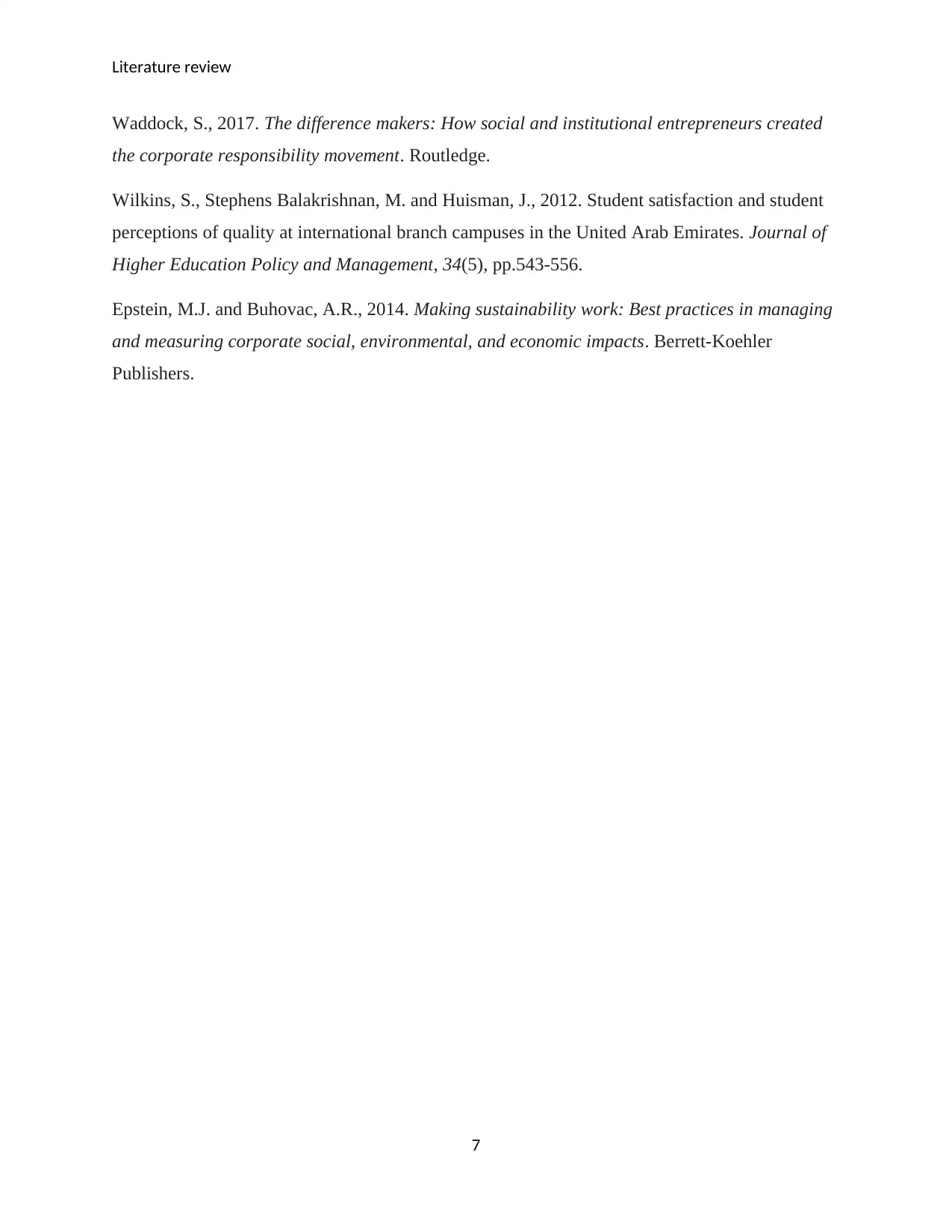
Literature review
Waddock, S., 2017. The difference makers: How social and institutional entrepreneurs created
the corporate responsibility movement. Routledge.
Wilkins, S., Stephens Balakrishnan, M. and Huisman, J., 2012. Student satisfaction and student
perceptions of quality at international branch campuses in the United Arab Emirates. Journal of
Higher Education Policy and Management, 34(5), pp.543-556.
Epstein, M.J. and Buhovac, A.R., 2014. Making sustainability work: Best practices in managing
and measuring corporate social, environmental, and economic impacts. Berrett-Koehler
Publishers.
7
Waddock, S., 2017. The difference makers: How social and institutional entrepreneurs created
the corporate responsibility movement. Routledge.
Wilkins, S., Stephens Balakrishnan, M. and Huisman, J., 2012. Student satisfaction and student
perceptions of quality at international branch campuses in the United Arab Emirates. Journal of
Higher Education Policy and Management, 34(5), pp.543-556.
Epstein, M.J. and Buhovac, A.R., 2014. Making sustainability work: Best practices in managing
and measuring corporate social, environmental, and economic impacts. Berrett-Koehler
Publishers.
7
1 out of 7
Related Documents
Your All-in-One AI-Powered Toolkit for Academic Success.
+13062052269
info@desklib.com
Available 24*7 on WhatsApp / Email
![[object Object]](/_next/static/media/star-bottom.7253800d.svg)
Unlock your academic potential
Copyright © 2020–2026 A2Z Services. All Rights Reserved. Developed and managed by ZUCOL.





